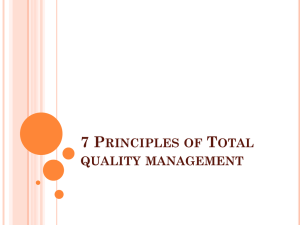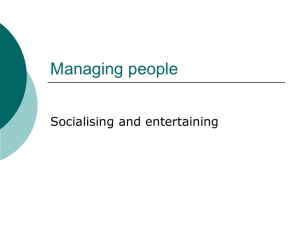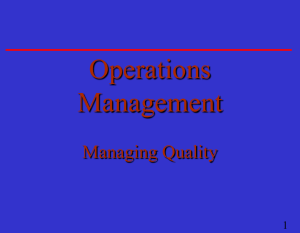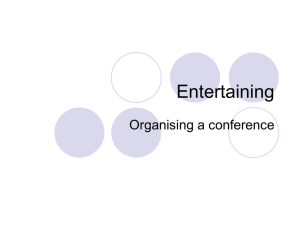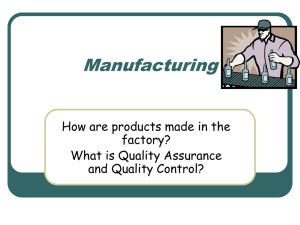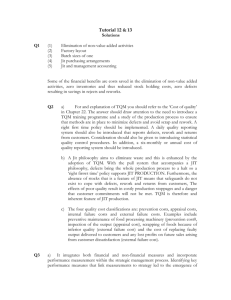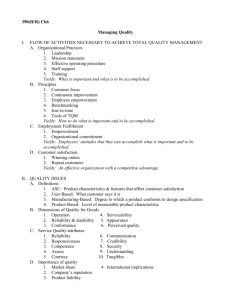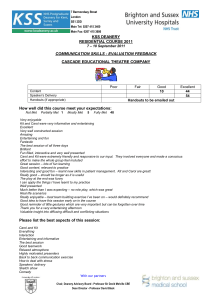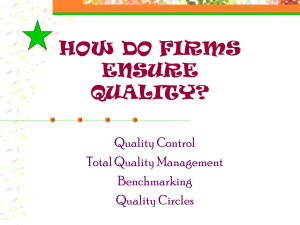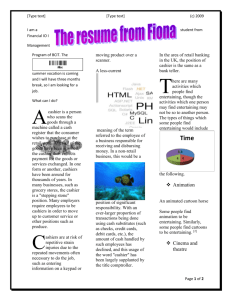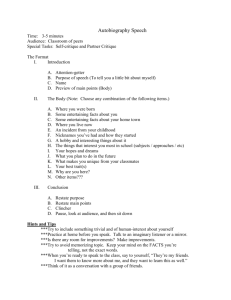Revision
advertisement
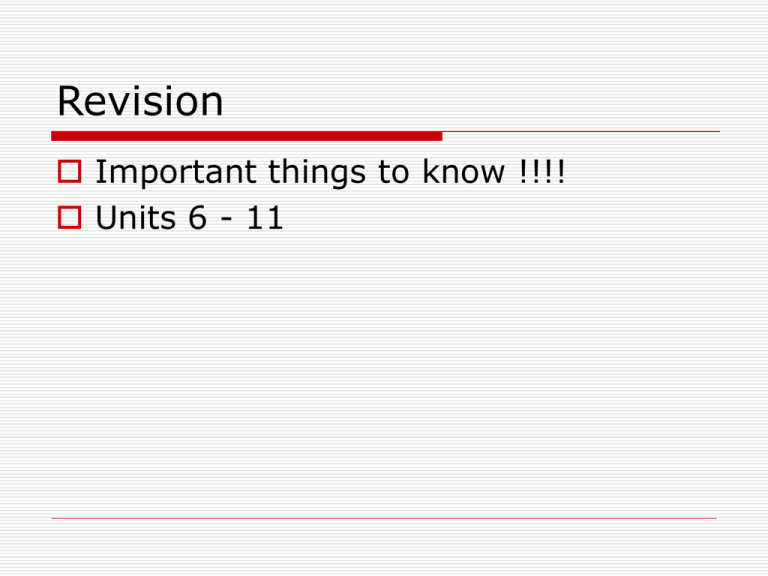
Revision Important things to know !!!! Units 6 - 11 Unit 6 : Entertaining It makes part of successful deals, positive attitude towards your partners Different cultures have different ideas about entertaining It is a good opportunity to know your partner better America and Europe : business people meet to do a deal Asia : to establish a relationship while entertaining a business partner one must think of the etiquette : behaviour ( a certain code ), unwritten rules of behaviour the etiquette is made of norms : norms are rules or guidelines which say what is acceptable in certain situations two good ways to start socialising are: greetings :social ritual used to show attention or to confirm friendship small talk : it is a chatter about ordinary things, everyday things greetings and small talk are good icebreakers when you feel unconfortable in a presence of a stranger Corporate entertaining is present in the modern business world : it is a well organised plan which involves socialising with business partners as a part of successful business deals some companies spend a lot of money on this in the Customer Relationship Management Programme this program helps a company to keep an old client Unit 7 : Marketing It is a business of advertising, promoting and selling a product ; marketing attracts customers and persuades them to buy a product You must find out what customers need / like = meet their needs Marketing involves: all activities from production to selling, indetifying customers,developing/promoting products, minimizing the costs/maximizing the returns to make a profit ( it means selling ) The marketing mix or the four Ps are: Product : deciding what product or service to sell Price : setting the attractive price Place : find suitable distribution Promotion : acctivities used to support the product From the customers point of view there are four Cs : Customer solution : offering the right product to satisfy particular customer needs Customer cost : the price paid directly Convenience : distributing the product Communication : informed about the product The key to successful marketing : a good creative campaign clear marketing messages customers orientation Unit 8 : Planning is a resource allocation and involves organising limited resources such as time, money and expertise It consists of a plan for using different resources to achieve goals for the future Planning also means time management ( suggest you to make a list, persue tasks one by one, delegate, not to be a perfectionist in everything ) Planning introduces the use of Gantt chart : an excellent tool for a complex project involving many people and tasks it is a diagram that shows the different stages of a project it is made of horizontal bars which show the relationship between task, activities and resources Another type of planning is called contingency planning : a management plan in case of emergency ( an event or situation that might happen in the future ); prepares for the worst Conclusion : planning is all about good strategy : companies make long term plans about the future, they predict competitors’ activities and company’s overall plan of development Unit 9 : Managing people Theory X : the idea that people dislike work and will do anything to avoid it Theory Y : everybody has the potential to find satisfation in work Theory W : ‘whiplash’, it is the idea that most work is done under conditions of slavery Different cultures have different ways of managing people: Some prefer frequent consultations in decision-making ( all members contribute to this process )= management by consensus Some encourage workers to use their own initiative = empowerment ( it is used to establish better relationships with customenrs and is linked to the idea of delegation = handing a task over to a subordiante ( give someone the authority to untertake specific activities or decisions ) In managing people the managers need to be good at : Observing : they must understand the behaviour, the strengths and weaknesses of their staff Listening : in order to learn staff’s problems Asking questions : to find needed information Speaking : in order to communicate their objectives clearly to all their staff Unit 10 : Conflict Can be productive as wellas unproductive Productive : there are often a number of different ideas and conflict is inevitable but different ideas lead to the best choice Unproductive : arguments between the colleagues or managers can become personal and can cost a company big money and time ( e.g. employees can even sue their company for unfair dismissal ) Labour-management conflict can take the form of : Strikes and go-slows ( a go-slow is a form of protest where workers deliberately slow down in order to cause problems ) Many countires use arbitration between the two sides : it is a form of alternative conflict resolution in which the parties ( opposite sides ) present their cases to a neutral third party and agree to respect his or her decision More and more companies in the US use ADR ro resolve conflicts : ADR is alternative dispute resolution which includes methods other than lawsuits ( these methods include mediation, arbitration and settlement ( negotiation ) and are less formal and cheaper than court process German managers : very direct and they speak their mind, they concentrate on the objective American : have a talent of communicating, use small talk and smile very often, the atmosphere is informal, attitude – ‘time is money’ Spanih negotiators usually interrupt you in the middle of the sentence, they use spontaneous ideas and quick thinking Unit 11 : New business represent the modern way of doing business face-to-face contact is of vital importance video-conferencing is effective but expensive relationship building is important for mutual benefits : clients and suppliers are called PARTNERS-they are in business together TQM – Total Quality Management : makes an important part of modern business it motivates, supports and enables quality management ( seek continuous improvements, focuses on the needs and expectations of internal and external customers ) one important objective of TQM is complete elimination of product defects Another form of new business is start-ups ( a one person operation often started by someone who gained knowledge as a salaried employee in an organisation ) ; this person decides to start a new company on his/her own Start up is also a term for any newly formed company Factors which encourage new business : flexible labour market where there are not only low taxes on companies but also low social costs skilled staff ( a good national educational system and good company training of employees ) low interest rates cheap rents for office and factory space a stable economy ( business people are able to plan better ) good transport links training courses High enemployment may mean two things : you can pay lower wages to your workers ; you may not be able to find the people with the skills you want Strong currency means that imported raw materials are cheaper but your exports will be more expensive Government grants may be used to try to persuade companies to set up in areas with high unemployment but if the area is unsuitable for other reasons these grants will not be enough Language the importance of language is setting up abroad Unit 12 : Products when we think of products we usually think of tangible product ; the product we can see or touch ; we think of physical objects we have just-in-time ( JIT ) ordering of components and TQM JIT – just-in-time is a management philosophy that reduces manufacturing waste by producing the right part in the right place at the right time no products are manufactured until they are needed coordinates demand and supply Economies in different parts of the world are at different stages of development : in newly industrialised countires ( in Asia ) more and more people are now able to afford consumer durables ( washing machines ) for the first time ( companies that sell these products can make large amounts of money ) in the West, the market for television or washing machines is basically one of replacement ( the products are not repaired but replaced ) In this situation, design, brand name, or image become more important ( e.g. some luxury cars become more affordable and manufacturers have to stay ahead of the game to avoid their brands being perceived as ordinary ) Consumerism – a modern force that manufacturers have to take into account It is an increased consumption of goods seen as economically beneficial It is also a term used to describe the effects of identifying personal happiness with purchasing material possessions There is some difference in the way people preceived the products in the past and the way we see them today: the cars, televisions and washing machines of the 1950s had more style and they were made to last, but modern products are techically better now. When a new product is developed it must be tested: Animals are very often used to test products which causes protests in some parts of the world Some people volunteer for medicine testing which is not without consequences for their health (in return, they receive money) The present trend is to move production to some Asian countries which offer the cheapest labour force
